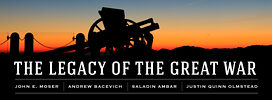I am indebted to all three of my commenters for filling some gaps in my account. Of course, in a 3,000-word essay (about fifty percent longer than what Cato originally asked for) there is much that I had to leave out.
Obviously, I agree that participation in the First World War had extremely important effects beyond domestic politics. Justin Quinn Olmstead is certainly correct in reminding us of the expanded role that the United States would play in the global economy after 1918. I disagree with him, however, that Wilson was much concerned about the war’s effects on individual liberty. Wilson’s famous quote, “Once lead this people into war and they will forget there ever was such a thing as tolerance” (which Professor Olmstead does not mention), and his less famous one that “the Constitution would not survive [the war]” (which he does), both seem to suggest this. However, as the late historian Thomas Fleming pointed out, the only source for these words is Frank I. Cobb, editor of the New York World and an ardent Wilson supporter. Cobb claimed that Wilson made these statements to him in the White House on the night of April 1-2, 1917, but White House logs show no record of his having been there. Perhaps I would be more willing to accept the portrayal of Wilson-the-civil-libertarian if he hadn’t so willingly signed the Espionage and Sedition Acts, or if he had spoken out even once in defense of German-Americans, labor radicals, or others targeted during his the war—not to mention his silence on the lynchings of African-Americans, which surged during his presidency.
I also find hard to accept Professor Olmstead’s statement that “involvement in the war meant his plans for international reform were not realized.” It is true that Wilson had, ever since August 1914, expressed the hope that the war would end in stalemate, giving the United States an opportunity to serve as mediator and to impose a new world order on an exhausted Europe. Indeed, he repeated this wish as late as January 1917 in his “peace without victory” speech. However, almost immediately after giving that speech the president seems to have come to the realization that his hoped-for stalemate was not going to materialize. Did this mean that he abandoned his hopes for international reform? Jane Addams certainly did not think so; when she and a group of fellow peace activists met with the president in February, he informed them that he had already decided to ask Congress for a declaration of war. “As head of a nation participating in the war,” Wilson told them, he “would have a seat at the peace table, but…if he remained the representative of a neutral country” he could do nothing more than “call through a crack in the door.” While it is true that he had to compromise repeatedly with the European Allies at the Paris Peace Conference, one gets no sense that Wilson believed that he had made some Faustian bargain by entering the war.
Andrew Bacevich likewise reminds us of the critical role that World War I played in undermining European imperialism. However, I believe he is too quick to dismiss the period 1917-18 “an episode in the emergence of the American Leviathan.” He is right in mentioning (as I also did) the return to “normalcy” that followed the war—something that did not occur after the Great Depression, World War II, or any of the crises that followed. My argument is that U.S. involvement in the First World War laid the foundation for the U.S. government’s response to all of these later episodes. The rapid mobilization for war, and the vast centralized control granted to the federal government, provided a blueprint for how to address future crises. Indeed, even as early as 1921, when the country faced a sharp economic contraction, Commerce Secretary Herbert Hoover sought to employ the “associationalist” tactics that he had learned during the war—and would have undoubtedly done so had the situation not improved dramatically that summer.
Finally, I thank Saladin Ambar for noting that the “character and values” of a government are as important as its form, and that the wartime state first developed during World War I was fundamentally incompatible with democracy. I agree with everything he has to say in his perceptive essay, which makes me wish I could have devoted more attention in my essay to the subject of race.

